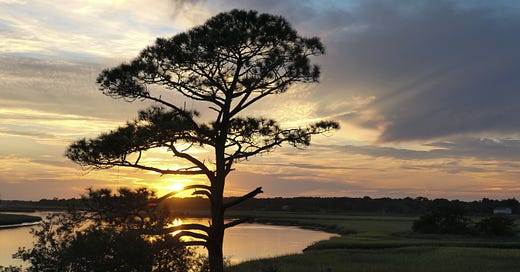In times of struggle and pain, when the world seems to tilt off its axis, we seek something solid that we can grasp to steady ourselves. As we confront continued injustice, as we mourn those lost to senseless bloodshed, as we wonder about an uncertain world, we can find strength in that which brings harmony and hope.
Over the years, I have found comfort in an image that has always spoken to me, and to which I have returned countless times for a sense of purpose and peace — a tree planted by the water.
I have stood by and in enough rivers over the course of my life to have no shortage of snapshots in my mind upon which to draw. I think back to mighty oaks, elegant birches, towering redwoods, majestic magnolias, and countless other species making their mark on dramatic landscapes.
But I also recognize the salient metaphor the image embodies. It comes from the Bible about the strength one gains from a relationship with God:
“Blessed is the man that trusteth in the LORD, and whose hope the LORD is. For he shall be as a tree planted by the waters, and that spreadeth out her roots by the river, and shall not see when heat cometh, but her leaf shall be green; and shall not be careful in the year of drought, neither shall cease from yielding fruit.”
— Jeremiah 17:7-8
The image of a tree by the water is at the heart and soul of one of my favorite hymns, “I Shall Not Be Moved,” which dates back to the era of American slavery and speaks to the courage with which enslaved people were forced to confront every day of bondage. This is a song they sang for strength and resilience in the face of horrors we could never fully imagine.
Its repeated line is one of incredible power: “Like a tree planted by the water, I shall not be moved.”
It is not surprising that “I Shall Not Be Moved” became a staple of the labor rights and civil rights movements. Along the way, as the song was sung in rousing choruses, the pronoun was often changed to the plural — We shall not be moved.
We shall not be moved. What force. What strength. What courage. Despite all life throws at us, as we struggle on a path to rectify injustice, to heal suffering, to lift up those who are most wronged, we shall not be moved.
To hear the song, I cannot help but smile. And in most performances I have seen over the years, those who sing these lyrics often end up smiling themselves. So today, we share two versions of the song with hopes that they bring a reason to smile, and soldier on, to you as well.
We start with the marvelous Rhiannon Giddens, a singer who channels the many roots of American music (pun unintended). Her performance infuses a depth of musicality with a voice of incredible richness and power.
We also share the incomparable Mavis Staples, who pairs her emotional performance with a poignant personal reflection of what it was like to use this song for strength as a young activist in the civil rights movement.
Note: If you are not already a member of the Steady community, please consider subscribing. We always appreciate you sharing our content with others and leaving your thoughts in the comments.




I woke up feeling nervous and anxious. I read too much yesterday. I’m afraid. Thank you for this today.
Thanks for this, Mr. Rather. It is my favorite verse. I love the translation in my Harper Collins Annotated Bible. "In the year of drought it is not anxious." It helps me remember that even during crazy times like these, when the sun of ignorance and injustice is beating down on our nation, the sweet fruit of liberty will one day return.